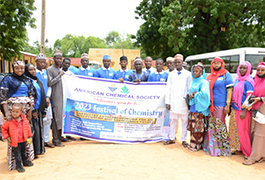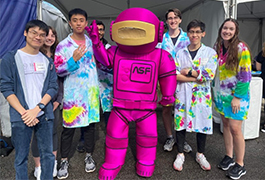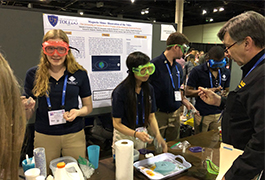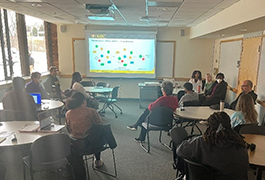How Teaming Up with Others Can Increase the Success of Your Chapter

Partnerships are the glue that holds the professional world together. Businesses and organizations rely on partners to expand expertise and tighten community connections. On your own career path, you’ll benefit from partners too. And there’s no need to wait until graduation to meet them.
By connecting your student chapter with other groups now, you’ll have the power to offer more programming for more of your peers. You’ll also form relationships with other students and professionals who can offer advice and support through your college years and beyond. Amazing partners are waiting for you. And they may be just a LinkedIn message away.
A partnership takes off
This past spring, Julian Bobb, chair of the ACS Virginia Section Younger Chemists Committee (YCC), wondered how he could keep his YCC active even as coronavirus abruptly ended in-person events. “I was thinking about starting to do virtual programming,” says Bobb, a postdoctoral researcher at Virginia Commonwealth University. “But I didn’t want to do it by myself.”
Bobb’s biggest concern was time. He was already leading a mentorship program and helping to plan a women’s leadership workshop. To offer more, he needed help.
That’s when he saw a notification on LinkedIn for “A Day in the Life of a Forensic Chemist,” the first talk in a new webinar-style series that helps students learn about careers from chemists on a wide range of professional paths. Lori Ana Valentín, chair of the Eastern New York YCC, created the series and spoke at this first event about her work as a forensic scientist for the New York State Police Crime Laboratory System.
Bobb signed on to the webinar and reached out to Valentín afterward over LinkedIn. “We got to talking,” says Valentín, “and it seemed like a good idea to share hosting of ‘A Day in the Life.’”
Around the same time, Valentín connected with the chair of the Philadelphia Section YCC, Isabella Goodenough, a graduate student pursuing her Ph.D. in physical chemistry at Temple University. The three chairs met over Zoom and quickly realized that by joining forces they could do more. “Between the three of us, we are very well networked,” says Valentín. “We can offer more professional development to a broader audience.”
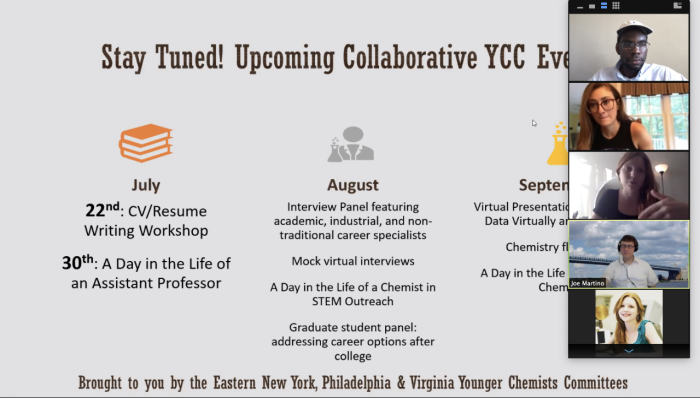
In June, they hosted their first joint event as the newly dubbed Eastern U.S. YCC Partnership. ACS career consultant and chair of ACS’s Philadelphia Local Section Joe Martino spoke to college students and young professionals about how to navigate a chemistry career in a COVID-19 world.
Since then, both the partnership and the programs have expanded. The Northern New York, North Carolina, Nashville, and St. Louis YCCs signed on, as well as the Chemistry Graduate Program at the University of Puerto Rico, Río Piedras. Together, they continue to offer the “Day in the Life” series, as well as virtual professional development workshops on topics ranging from interviewing and networking to stress management and preparing for graduate school.
Team members take turns leading weekly planning meetings and hosting events. If someone needs to step away briefly, others fill in. For two months this summer, Valentín took a break from the partnership to focus on running an internship program. Programming continued without her. “You can’t have [a group] hinge on one person in particular,” says Valentín. “There has to be a really developed infrastructure so that it can become its own entity and keep moving forward.”
The partners also teach one another skills that no one picked up in chemistry class. How do you advertise an event? How do you create a QR code for a promotional flyer? “One of the advantages is being able to learn from each other,” says Bobb, “in terms of planning, organizing, and even writing reports after the events.”
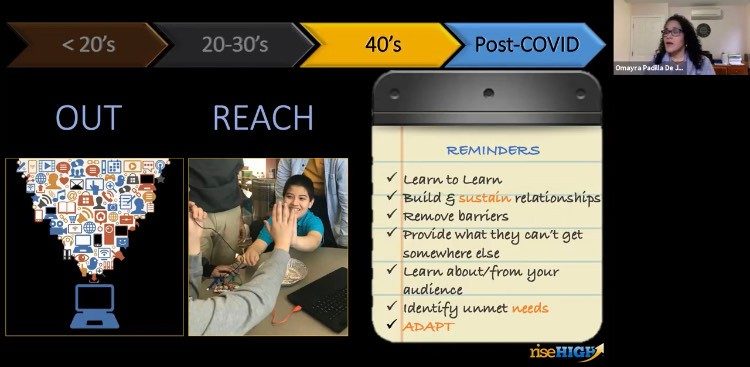
How to build your own partnerships
The Eastern U.S. YCC welcomes student participation. But you can also form your own local partnerships to create the programming and relationships most beneficial to your student chapter.
The first step is networking, whether with other ACS student chapters, local sections, technical divisions and committees or with other professional organizations in your community. Don’t know whom to contact? Attending local section and Younger Chemists Committee meetings is a great way to meet people and feel out who shares similar goals.
You can also reach out to chairs of organizations over LinkedIn. “It’s really important to master the art of cold messaging,” says Valentín. She suggests that students can begin conversations over LinkedIn by commenting on a recent achievement or sharing an article relevant to both of your interests.
You can also draw on the professionals that you do know: your professors. “It is a matter of having the right connections,” says college junior Dinora Rodriguez, a chemistry major and public relations manager for the University of St. Thomas ACS Student Chapter in Houston, TX. Her chapter’s faculty advisors help students maintain close ties to the ACS Greater Houston Section.
“Since I am chair of the Greater Houston Section, I am really plugged into what the local section is doing,” says Crystal Young, an associate professor of organic chemistry at the University of St. Thomas and co-advisor of the student chapter. The local section regularly calls on student volunteers for community outreach activities and invites students to networking events. Through these interactions, students learn “what actual chemists do in their real jobs,” says Young.
Through Young, students also offer feedback on what local section programming would be most beneficial to them. Young is currently working with the Corning Local Section (NY) to develop a virtual program to guide students on how to succeed in a virtual panel interview.
The University of St. Thomas ACS Student Chapter also partners with other scientific clubs on campus. Last fall, for example, they invited their school’s HOSA-Future Health Professionals chapter, an international student organization that provides leadership and skills development in health fields, to cohost a presentation on tips for preparing medical school applications. “It’s all about building a community, a scientific community with like-minded people that appreciate the same things that we do and are looking to pursue the same goals,” says chapter president Nickolette Kong, a senior majoring in biochemistry.
Connecting with students at other universities can help expand that community even further. And professors can help make those connections happen too. “[Every fall,] I contact all of the professor friends that I have and say, ‘Can you give me the e-mail of your student president for this year?’” says Matthew Mio, a professor of chemistry and biochemistry at the University of Detroit Mercy and an ACS student chapter faculty co-advisor.
As a result, Mio’s student chapter maintains long-standing relationships with nearby chapters such as Wayne State University and the University of Michigan, Flint. Cameron Johns, the 2019 chapter president, who graduated in May with a biochemistry degree, recalls volunteering last fall to help students at Wayne State’s chapter in their effort to paint the world’s largest periodic table. Students from chapters across the region were chatting with whichever “element neighbor” happened to be working next to them. “Just being in the same room with students from other student chapters, you start talking and bouncing ideas off of each other,” says Johns. “You’re able to share ideas for volunteering, community outreach, or fundraising.”
This year, Mio is also planning to reach out to Wayne State’s chapter of the National Organization for the Professional Advancement of Black Chemists and Chemical Engineers. Connecting with student groups at other universities can help smaller schools like his tap into organizations that they might not be able to sustain membership to alone, he explains.
Not every potential partner is the right fit, so don’t get disheartened if you reach out and don’t hear back, says ACS student advisory board member Basudeb Bhattacharyya, a chemistry and biochemistry lecturer and student chapter advisor at the University of Wisconsin, La Crosse. “It is about finding the right connection. That can take time,” he says. “But once you can make that connection, it can be very powerful.”
When you do find strong partners, you can plan events together even with little funding. Many professionals, for example, are willing to volunteer to speak to student organizations. The Eastern U.S. YCC has spent around $300 total on all of the programming that they’ve offered, and much of that money went toward ACS gift cards as door prizes. The team also recently received an ACS Local Section Members Engaging Through Technology grant that will allow them to expand their workshops to include experts who do charge fees.
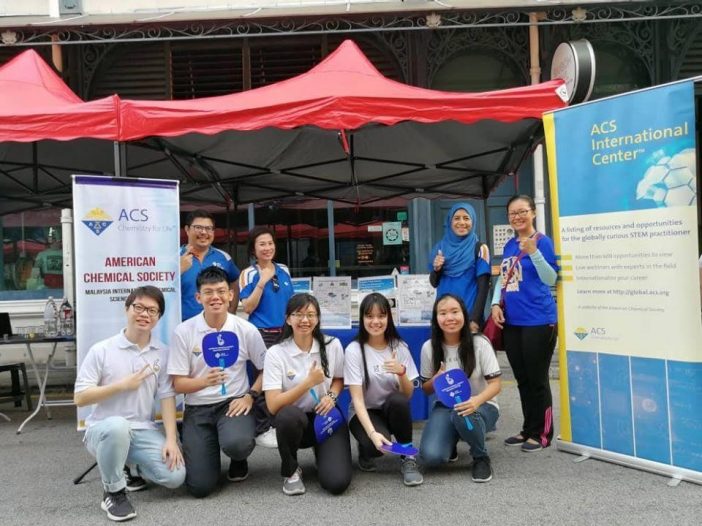
Keeping partnerships running professionally
When working with other students and professionals, it’s important to communicate regularly. “There is good communication on all of our parts and we do a lot of e-mailing together,” says Bobb.
Meeting regularly is also key, though you may find that as partnerships grow, scheduling times that accommodate everyone’s schedule can be difficult. “Our challenges have been generally more logistic,” says Valentín. “Finding a time that works for everyone.”
When you do hold meetings, it’s important for everyone to feel valued. “Every YCC section has a leadership role by leading different meetings or different events,” explains Valentín. “The responsibilities are very well distributed, and I think that minimizes conflict.”
If you’re unsure how to conduct yourself in meetings with professionals, just try to be observant and stay agile, says Mohd Firdaus Abdul-Wahab, a biosciences senior lecturer at the Universiti Teknologi Malaysia and current chair of the ACS Malaysia International Chapter. Some professionals are laid back and sociable while others are more serious. “Look around you at how people act and then adjust accordingly,” he says.
You should also never underestimate the value that you as a student can bring to a professional organization. Hooi Ling Lee, a physical chemistry senior lecturer at the Universiti Sains Malaysia and the immediate past chair of the Malaysia International Chapter, says that student chapters across Malaysia take turns co-organizing ACS events with the Malaysia International Chapter, including outreach programs like the ACS Chemistry Festival and the Southeast Asia Global Innovation Challenge. “This approach ensures no single university student chapter or member is overwhelmed with work,” she says.
Partnerships with students can also maintain the longevity of an organization. “[Young chemists] are the future of the division,” says chemist and regulatory strategist Kimberly Agnew-Heard, Ph.D., a director at Altria Client Services, LLC in Richmond, VA, and immediate past chair of the ACS Division of Analytical Chemistry. Her division recently created a committee focused on younger chemists with the goal of partnering with YCCs in the future. The committee, which includes students, works to make sure that female and minority students are represented now so they’ll continue to be an integral part of the division as their careers progress.
To get your own partnerships up and running, you’ll likely have to reach out to someone new, which can feel intimidating. “The activation energy of this whole process is getting over that,” says Valentín. Even if you’re nervous, she says, it’s worth saying, “Hey, I wanted to talk to you about your organization and see what you are working on. Maybe we can work together.”


